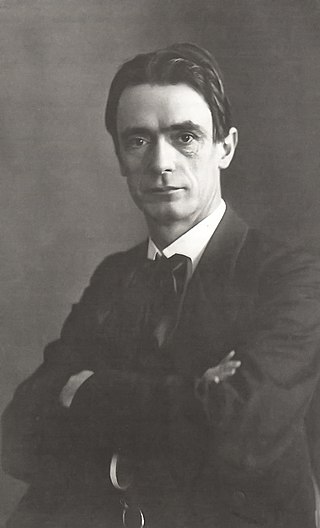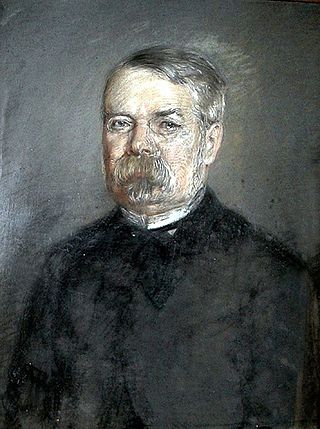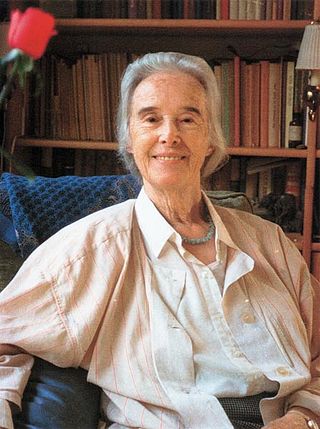Related Research Articles
Anthroposophy is a spiritual new religious movement which was founded in the early 20th century by the esotericist Rudolf Steiner that postulates the existence of an objective, intellectually comprehensible spiritual world, accessible to human experience. Followers of anthroposophy aim to engage in spiritual discovery through a mode of thought independent of sensory experience. Though proponents claim to present their ideas in a manner that is verifiable by rational discourse and say that they seek precision and clarity comparable to that obtained by scientists investigating the physical world, many of these ideas have been termed pseudoscientific by experts in epistemology and debunkers of pseudoscience.

Rudolf Joseph Lorenz Steiner was an Austrian occultist, social reformer, architect, esotericist, and claimed clairvoyant. Steiner gained initial recognition at the end of the nineteenth century as a literary critic and published works including The Philosophy of Freedom. At the beginning of the twentieth century he founded an esoteric spiritual movement, anthroposophy, with roots in German idealist philosophy and theosophy. His teachings are influenced by Christian Gnosticism or neognosticism. Many of his ideas are pseudoscientific. He was also prone to pseudohistory.
Eurythmy is an expressive movement art originated by Rudolf Steiner in conjunction with his wife, Marie, in the early 20th century. Primarily a performance art, it is also used in education, especially in Waldorf schools, and – as part of anthroposophic medicine – for claimed therapeutic purposes.
Anthroposophic medicine is a form of alternative medicine based on pseudoscientific and occult notions. Devised in the 1920s by Rudolf Steiner (1861–1925) in conjunction with Ita Wegman (1876–1943), anthroposophical medicine draws on Steiner's spiritual philosophy, which he called anthroposophy. Practitioners employ a variety of treatment techniques based upon anthroposophic precepts, including massage, exercise, counselling, and administration of substances.

Ita Wegman co-founded Anthroposophical Medicine with Rudolf Steiner. In 1921, she founded the first anthroposophical medical clinic in Arlesheim, known until 2014 as the Ita Wegman Clinic. She also developed a special form of massage therapy, called rhythmical massage, and other self-claimed therapeutic treatments.
Eugen Kolisko was an Austrian-German physician and educator who was born in Vienna. He studied medicine at the University of Vienna, and in 1917 became a lecturer of medical chemistry. He was the son of pathologist Alexander Kolisko (1857-1918).

Adolph Aloys Freiherr von Braun was a diplomat and statesman who became one of the closest collaborators of the Emperor Franz Joseph I of Austria. He was the Privy Councillor and Director of the Emperor's Cabinet's Chancellery from 1865 to 1899.
Ernst Lehrs was a German anthroposophist, Waldorf teacher, lecturer and writer.
Wilhelm Pelikan was a German-Austrian chemist, anthroposophist, pharmacist, gardener and anthroposophical medicine practitioner.
Oskar Schmiedel was a pharmacist, anthroposophist, therapist, Goethean scientist and theosophist.
Hermann Poppelbaum Dr. Phil. (1891–1979) was an anthropologist, psychologist, philosopher, anthroposophist, teacher and author.

Weleda is a multinational company that produces both beauty products and naturopathic medicines. Both branches design their products based on anthroposophic principles, an alternative medicine.
Karl Ludwig Reinhardt was a German classical philologist.

The Frankfurt University Library is the library for the Goethe University Frankfurt, Germany.
Conrad Henfling, musicologist, musician, mathematician and lawyer was an official and privy councilor (Hofrat) at the court of the Margrave of Ansbach, Germany. He also invented a new type of keyboard for organ and harpsichord, the design of which was extended by Paul von Janko in his 1882 patent for a keyboard layout.
Peter Selg is a German psychiatrist. He was born in Stuttgart and studied medicine in Witten-Herdecke, Zurich, and Berlin. Until 2000, he worked as the head physician of the juvenile psychiatry department of Herdecke hospital in Germany. Selg is director of the Ita Wegman Institute for Basic Research into Anthroposophy and professor of medicine at the Alanus University of Arts and Social Sciences (Germany). He lectures extensively and is the author of numerous books.
Sunfield is a private special school, Children's Home and charity on the border of Worcestershire and the West Midlands in England. It was founded in 1930 and now supports boys and girls, aged 6 – 19 years, with complex learning needs, including autism.
Hans Schauder, was a British medical adviser and counsellor, co-founder of Camphill Community, founder of Garvald School & Training Centre

Liane Collot d'Herbois was a British painter and anthroposophical painting therapist. She researched light, dark, colour and their application in painting and therapy.
Dr. Hauschka is a German skincare company that produces natural skincare products using biodynamic, fair trade, and sustainably produced ingredients.
References
- ↑ Hauschka, Rudolf (2000). At the Dawn of a New Age. ISBN 9780919924253.
- ↑ Reinsperger, Regina. "Otto Ohlendorf" (PDF). Trans. Klaus Popa. egoisten.de. Retrieved 2013-03-19.